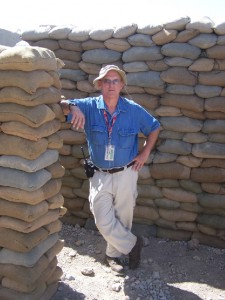 Transition is the thread that binds the last portion of Phil Nerges’s Iraq odyssey to his book, Iraq Journal–Sketches from the Contracting Life. He had made it out alive to recreate his life back home. Nerges saw no literature about the contractors and their families to aid in his own transition after his final return stateside. Within 3 years he had compiled a book to reflect their stories.
Transition is the thread that binds the last portion of Phil Nerges’s Iraq odyssey to his book, Iraq Journal–Sketches from the Contracting Life. He had made it out alive to recreate his life back home. Nerges saw no literature about the contractors and their families to aid in his own transition after his final return stateside. Within 3 years he had compiled a book to reflect their stories.
In the fall of 2011, Helena Kaufman interviewed Phil Nerges about his mission to share the life of contractors working alongside the military in Iraq. The first posts were published just before we heard President Obama’s announcement of the end of war in Iraq.
 The book is based on emails home, in fast and frightening times. Nerges used his love of language and photographer’s eye to capture sights, sounds and memories made while he sorted his life and then began the transition home.
The book is based on emails home, in fast and frightening times. Nerges used his love of language and photographer’s eye to capture sights, sounds and memories made while he sorted his life and then began the transition home.
“More than military men and women are coming back,” says Nerges. Transition is the upcoming experience for tens of thousands of military personnel returning from America’s longest wars.
“Contractors now comprise nearly half of our military presence,” says Nerges. “They suffer similar injuries and after effects to what the soldiers do. Yet, when casualty figures are released, injured contractors are not included with them. Contractors also die anonymously.”
People in the neighborhood
“The military is comprised of our society members. They bring their views, educational backgrounds and individual life experiences. I worked with everyone. Over time proportion of foreign workers went up and included Pakistanis and Indians. Eventually more Iraqis were employed.
Stimulating the flow of writing were co-camp-followers’ stories, and even graffiti he saw in Baghdad.
Accompanying him on his interpretations of his new day to day survival of his life, Nerges had a little list of inspiration in his virtual book bag.
“I read All for the Union: The Civil War Diary & Letters of Elisha Hunt Rhodes, years back. He had a gift for describing what he saw, the horror of it, but also the everyday things too, like loneliness, boredom and mud. Somehow, that made it more real. I read accounts by civilians too, Walt Whitman’s Memoranda During the War, and Marguerite Duras’ The War: A Memoir. Together, they made me realize the value of meditating on the madness around me.”
“People take their personal baggage to a war zone. In that environment, thoughts about your life pop into your head. Then, when you go home, you bring back memories of Iraq. Gotta solve your problems. Address it. Talk about it.”
On reading the Iraq Journal, Cpt. Nate Brookshire, co-author of Hidden Wounds: A Soldier’s Burden called it “honest.” Nerges is proud of that evaluation and hastens to add, “A lot of it is about a terrorized fat guy running from explosions.”
“I wanted to show the descent into disillusionment, fear, isolation, and the climb back out. After I wrote the book of short stories, it was noticeable to others that I got–calmer.
What is Nerges advice? “Know what you are getting into.”
Did he climb out? Would he do it again?
“I probably would do it again in the right situation. When I went I was idealistic. I came back disillusioned. Lots of criticism in the news about the workers including Indians and Pakistanis was unfair. Left me with distaste for politics.” Both sides did things he found ‘irritating’.
Nerges found a creative way to deal with his life in general and the Iraq factor in it. He also applied many skills to write, produce and perform work that represents an underrepresented community whose baggage before and after Iraq will strain America with its needs coming home.
There’s Don’t Feed the Cats in Iraq: A CD of seven songs and stories about civilian workers in Iraq, lyrics and stories by Phil Nerges, music created and performed by Vic Ruggiero of the Slackers. His first book, They Must Be Hungry and the soon to be launched, Iraq Journal–Sketches from the Contracting Life. (Note: Iraq Journal is now in its 2nd edition already and available on Amazon.)
The Iraq experience is indelible. It’s made ‘home’ look a lot different now.
Find Nerges’ work on Amazon and news about him at his website www.dustsong.com

Speak Your Mind